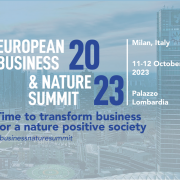Are we expecting too much of our SMEs?
After a phenomenal week in Brussels as co-hosts of the European Business and Nature Summit (EBNS), I noted that there was a distinct lack of attendance by the Small-to-Medium Enterprise (SME) community, despite having numerous sessions dedicated to them. Why is that?
Having previously run an SME myself, I know only too well that engaging with something like EBNS is incredibly challenging for an SME. The day-to-day work of an SME is ever-changing, dynamic and all-consuming. How can an SME possibly undertake any more challenging, seemingly external problems, like becoming nature-positive? My view is that SMEs won’t truly mobilise until they have to. Regulation and mandatory disclosure is the only way that we can push this sector of the economy forward, but it needs to be simple, a word that is not typically associated with nature and biodiversity.
SMEs often feel like this kind of work is only relevant to large corporations and that their relative impact is small and insignificant. This is something that those of us working in this space need to demystify. SMEs have a massive collective impact and like everyone else, they too need to assess their impact on nature and try to minimise it. It is estimated that around 60-70% of environmental impact comes from the SME sector. (Marshall Report)
To have any chance of making progress SMEs need a few key things. Regulation, funding, education and long-term support. There is a significant awareness and education gap within business that needs to be addressed quickly. SMEs need to build their own capacity to manage these new business strategies that we are expecting them to produce. Most will probably need external expertise and that costs money. Should we employ a “Robin Hood” style approach to mobilising SMEs? Where larger corporations fund the SMEs in their value chain to help them become more nature-positive. Or should this kind of support come from government or local authorities?
Either way, for SMEs to mobilise for climate or nature, they need:
- Awareness & understanding of the issues
- Additional financial support to help them develop & action environmental strategies
- Long-term support to enable them to continue to operate in an ever-changing economy
More than that, real change will only be triggered with regulation. And that needs to happen quickly.












